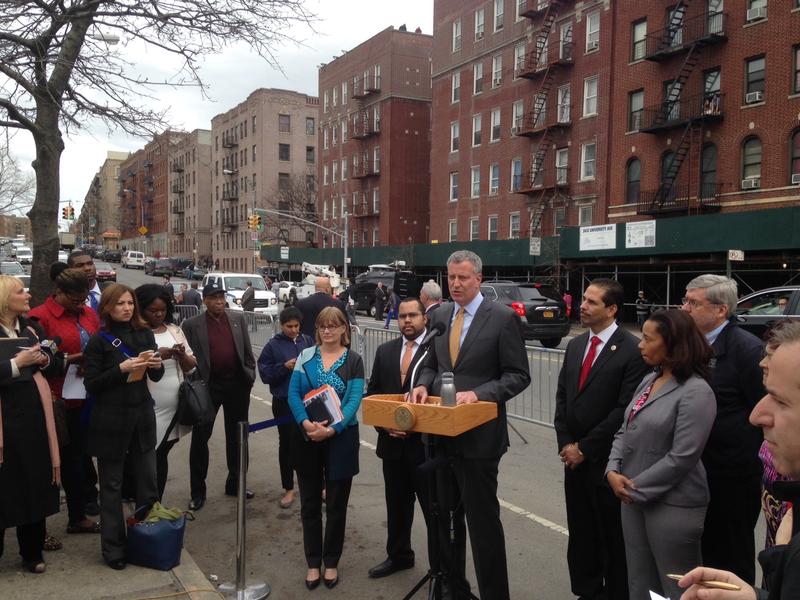
Just weeks before it is set to expire, Mayor Bill de Blasio introduced an overhaul of a controversial real estate tax cut used to spur development of affordable housing. He also called for the creation of a city mansion tax to fund more affordable apartments.
Under the reforms, the tax abatement, called 421-a would be extended to 35 years. But it would also require all real estate developers who get the benefit to construct up to 30 percent affordable housing in their projects. That is an increase from a previous requirement of 20 percent.
“No more tax breaks without building affordable housing in return. Period," said the mayor in a statement. "This can’t be a city of just penthouses and luxury condos. We are turning the page, and making sure the same pressures that have pushed New Yorkers out of their neighborhoods are harnessed to build the next generation of affordable housing.”
The plan would give developers three options to meet the affordability requirement. Two of those options would not require developers to create apartments for some of the poorest New Yorkers: households of three or more who make less than about $25,000 a year, or about 40 percent of the area median income as set by the federal government each year.
Advocates fear that the Mayor’s proposal is so weak that it will continue to displace long-time residents.
“The extension of 421-a in any form or fashion is going to continue to uproot neighborhoods, displace people, and add to the gentrification we are already seeing in Brooklyn, Queens and expanding to the Bronx,” said Jonathan Westin, executive director of New York Communities for Change.
The 421-a tax incentive program was created decades ago to incentivize building by developers, when little construction was happening in the city. Over the years, developers were required to build affordable housing in some areas in order to qualify for the tax abatement.
But this year the 421-a program was responsible for tax breaks of up to 95 percent in some luxury towers, like at Extell Development's soaring glass tower overlooking Central Park, 157 West 57th Street.
The Real Estate Board of New York, which represents developers, backs the mayor's plan, but is concerned that the tax abatement program can only be used to build rental buildings and not condos.
“The issue of condos will have to be dealt with in the future if we see a change of the market,” said REBNY president Steve Spinola.
City officials admit the new proposals, especially the tax on sales of luxury properties, may impact the recent frothiness in the market.
“We want to make sure we have a more balanced housing market than what we’ve seen over the past couple of years, so to the extent that eliminating 421-a on luxury condos does have an impact on condo production, I think that we don’t see that as a bad result,” said Alicia Glen, deputy mayor for housing and economic development.
The proposal would also eliminate the so called ‘poor door’ policy that allows developers who qualify for the 421-a tax break to build a separate entrance on projects that mix apartments for low and middle income families and market rate tenants. Going forward, all affordable housing would have to be built on site.
All the proposed changes will have to be approved by Albany before the law expires in June. That could be a difficult in the current session, even with the support of New York City’s real estate community.
Recent high profile arrests of elected officials on charges of corruption – first of former Assembly Speaker Sheldon Silver and then Senate President Dean Skelos – have tainted the 421-a program. Real estate developers who benefited from the program were involved in both indictments.
